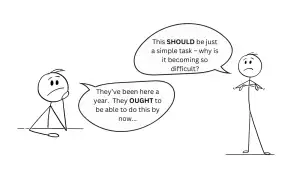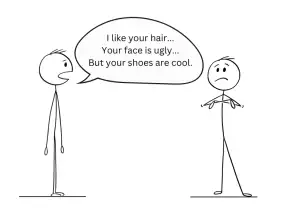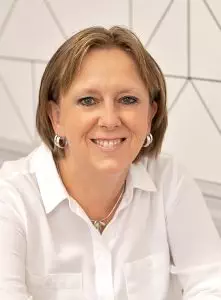Authentic Leadership
Two words that say you have an accountability and responsibility problem – and how to solve it…
Two words that say you have an accountability and responsibility problem – and how to solve it…
by Karen Amos
As I coach, I am trained to listen. I mean REALLY listen. Not just to the narrative, but to those key words from my clients that pop up without thinking, but that tell me so much.
There are two words I hear so often from managers at all levels and when I do, my little coach radar pings into action. (It’s like ‘spidey-sense’ without the cool outfit and wall climbing!)
The two words?
SHOULD and OUGHT
I’m sure you’ve said this – I certainly have and when I’ve done so it’s usually with a sense of exasperation at someone – and invariably due to something they haven’t done right, or at all.
You know how it goes…
‘They’ve been here a year. They OUGHT to be able to do this by now…’
‘This SHOULD be just a simple task – why is it becoming so difficult?’
These sentences are often accompanied by other words such as…
‘It’s obvious…’
‘It’s common sense…’
My late and much-missed friend and mentor used to say, ‘The problem with common sense is it’s not that common!’
What all these phrases tell me as a coach is:
- There are some assumptions being made
- There is a gap between desired and actual performance
- There’s a lack of communication somewhere
So before you descend into full tearing your hair out stage (or your preferred method of manifesting stress and frustration), why not take a coaching approach to find out what’s REALLY going on?
At first glance, this is a counterintuitive approach. Someone is doing something they shouldn’t, so we’re not going to tell them what to do, we’re going to ask questions instead. Huh? Isn't that just letting them off the hook? Just the opposite actually...
Here are a few coaching questions to start you off…
- Am I sure the other person knows what is expected of them?
- How do I know this – what’s my evidence?
- Have I spoken to the person about this? (NB: Dropping in vague or sarcastic hints in the hope they will ‘get it’ and suddenly change their behaviour does not constitute ‘speaking to’ someone.)
- Are there clear and consistent standards regarding processes and work across the whole organisation?
- Do you know the reason or cause of the problem?
By putting aside our assumptions, we can build on the answers to these questions to set out a clear plan of action moving forward. And the best bit? You can’t lose with this approach. You work with the person to find the solution and if it works, well the job’s a good ‘un as they say round these parts.
And if it doesn’t work? Well you now have evidence to commence formal capability or performance management measures should you need to. At the very least you’ve clearly set out expectations and standards in your own organisation or team.
If you’d like to help yourself or your managers to build accountability and responsibility in your teams, we offer down-to-earth, practical support from online and face-to-face training sessions, to 1-to-1 and team coaching sessions. Check out our training pages using the links below for more information.
Or why not EMAIL US, or book in an informal chat using the button below. We'll find out about the support you need and provide you with a no-obligation quote.
 Karen Amos is an executive coach and Director and Founder of BrightBird Coaching & Training. She supports business owners, managers and education leaders to get the best out of themselves and their teams. She brings a down-to-earth approach to improving working lives through better leadership, communication and working relationships.
Karen Amos is an executive coach and Director and Founder of BrightBird Coaching & Training. She supports business owners, managers and education leaders to get the best out of themselves and their teams. She brings a down-to-earth approach to improving working lives through better leadership, communication and working relationships.
Tel: 07714 855757 or email: [email protected]
Difficult Conversations: Why you should ditch the praise sandwich...
Why you should ditch the praise sandwich – And what you should do instead…
by Karen Amos
Every time I run a Managing Difficult Conversations training course, I have at least one delegate who advocates using the ‘Praise Sandwich’ as a structure for their conversation or feedback. I can understand why and I’ll come onto that in a moment, but first a quick explanation of what this is for those who have never heard of it.
The praise sandwich is an approach to giving feedback that starts with something positive, then adds the negative feedback, followed up by something positive to close. There is another school of thought that calls this a **** sandwich, for obvious reasons, but let's stick with the 'praise' version to save our sensibilities!
So let's look at why we use it - then we can look at why we shouldn't in a moment.
There are several reasons why the praise sandwich seems attractive to the feedback-giver. One of the main ones though, is that that we erroneously see this as ‘kind’. I mean, think about it – of course it’s kind. We’re saving the person’s feelings by telling them all the great stuff they do and leaving them on a high – fully motivated to go back to work. And we can breath a sigh of relief and tell ourselves, 'That went well...'.
Except…
OK, rather an extreme example, but the effect is the same – the message will be either lost, or misinterpreted. You’ll come across as either dishonest and manipulative, or you won’t get the change you wanted in the first place.
Years ago I had a manager who used this approach all the time. I had no idea whether I was doing a great job, or whether I was on the verge of being sacked!
So what should we do instead?
Surely, if we don’t fluff up the message at the end with something positive, we’ve a demotivated, or even irate member of staff on our hands?
Actually, I don’t believe that needs to be the case. We just need to say what we need to say - but the key is to say it well.
I like to call this the 4 C's:
- Courage - Having the backbone to deal with situations instead of burying our head in the sand and hoping it will go away
- Clarity - Saying what you have to say, getting to the point and not fluffing up the message
- Compassion - In our haste to deliver the message, it's sometimes easy to forget there's another person on the other end of this conversation, so let's treat people as we would like to be treated ourselves
- Collaboration - Working 'with' rather than doing 'to'. This coaching approach is a sure fire way to build commitment and achieve positive outcomes
So hopefully you can see that by using a coaching approach to give feedback and have those ‘difficult conversations’ we build commitment, accountability and personal responsibility. It’s supportive, but definitely not 'fluffy bunny'.
So here’s a quick coaching question to finish off…
- What are you most worried about when having a ‘difficult conversation’ with your team and what effect does this have on your approach?
If you’re interested in learning tips, tools and how to take a coaching approach for better ‘difficult conversations’, check out our latest live, interactive training workshops.
Click on the link below to find out more:
Or why not EMAIL US, or book in an informal chat using the button below. We'll find out about the support you need and provide you with a no-obligation quote.
 Karen Amos is an executive coach and Director and Founder of BrightBird Coaching & Training. She supports business owners, managers and education leaders to get the best out of themselves and their teams. She brings a down-to-earth approach to improving working lives through better leadership, communication and working relationships.
Karen Amos is an executive coach and Director and Founder of BrightBird Coaching & Training. She supports business owners, managers and education leaders to get the best out of themselves and their teams. She brings a down-to-earth approach to improving working lives through better leadership, communication and working relationships.
Tel: 07714 855757 or email: [email protected]
5 Questions to Find the Silver Bullet to Great Leadership...
5 Questions to Find the Silver Bullet to Great Leadership...
by Karen Amos
I bring you leadership bad news and good news... and 5 coaching questions to help you find the silver bullet to great leadership.
I had an interesting conversation with a client recently about people’s expectations of leadership. She said many upcoming and existing leaders in her teams are looking for that ‘Silver Bullet’ that solves all their leadership problems. Funnily enough, this cropped up again a few days later with another business contact.
The fact is, anyone who is interested in personal and professional development will find themselves inundated with book suggestions and social media posts on how ‘this one thing’ will ‘transform’ your professional life/leadership style/financial situation… blah, blah, blah…
Do I sound a bit cynical? Well I am. I don’t want to throw shade on other people’s work and indeed I am an avid collector and reader of said books and posts. I love learning. But here’s the kicker – learning isn’t doing.
And how easy is it to collect these books and blogs and not only never read them, but certainly not put them into practice? I had a friend who had every self-help book known to woman-kind on her shelves. Yet, she couldn’t understand why she had so many, but wasn’t rich/thin/motivated/calm [delete as appropriate].
The reason was simple. She’d read the first chapter on each one, found she actually had to change something for this to work and moved onto the next new thing.
So let’s get the bad news over with… There is no single ‘Silver Bullet’ to good leadership.
There. Wasn’t so bad was it? Perhaps a little disappointing, but I’m sure you knew already that any small hopes you had of any easy fix weren’t rooted in reality, didn’t you?
The fact is, leadership and people management in particular, is tough. It’s messy, gnarly, emotive and I think (please tell me this isn’t just me), all the more fascinating for it.
So what’s the good news? After all, I did promise some…
Well here it is...
You already have everything you need to be an amazing leader of people.
You don’t need a silver bullet because you have YOU!
You just need the courage and some small skills and techniques to put that into place. No gimmicks, no quick fixes, just good, honest person-centredness, a sound ethical base and an eye on what’s really important.
That’s why I love Bill George’s Authentic Leadership approach. It’s about being yourself, not some parody of a top ‘business guru’, ending up being a caricature like The Office’s David Brent.
So where to start? How do you cut through all the information out there and know what you don’t know?
Here are five coaching questions to get you started…
- What kind of leader or manager do I aspire to be?
- Which people in my past would I like to emulate? What was so great about them?
- What am I most afraid of when it comes to managing people and leadership? (Be honest here – this exercise is for your eyes only.)
- Who do I know who deals with this issue well? What do they do that I can put into place?
- What one step can I take right now that will help me overcome this barrier?
I’d love to hear your thoughts on this and remember, you can contact us any time for an informal chat, even if it’s just for a listening ear!
If you’d like to learn more about how to take a coaching approach to Managing Difficult Conversations and people management, we’ve just launched our Summer 2024 public courses.
Click on the link below to find out more:
Or why not EMAIL US, or book in an informal chat using the button below. We'll find out about the support you need and provide you with a no-obligation quote.
 Karen Amos is an executive coach and Director and Founder of BrightBird Coaching & Training. She supports business owners, managers and education leaders to get the best out of themselves and their teams. She brings a down-to-earth approach to improving working lives through better leadership, communication and working relationships.
Karen Amos is an executive coach and Director and Founder of BrightBird Coaching & Training. She supports business owners, managers and education leaders to get the best out of themselves and their teams. She brings a down-to-earth approach to improving working lives through better leadership, communication and working relationships.
Tel: 07714 855757 or email: [email protected]
How courageous is your leadership?
We have never needed courageous leaders more...
by Karen Amos
Leadership is all over the news. Firstly there's the Post Office scandal. Much of this will be new to many people, but the fact is, this is far from a new issue. I was first aware of it around 2010, as an acquaintance was one of the Post Masters in question. He ended up taking out a huge loan to patch up a financial hole, not of his making, or risk prosecution and lose the family business. The impact was devastating on his physical, mental and financial wellbeing. The situation was picked up and consistently reported on by media outlets such as Private Eye, Radio 4 and Panorama, but still no meaningful movement from either the Post Office, or indeed the government, despite them being well aware of this. People jailed, made bankrupt, family breakups and suicides. Still no-one stepped forward. Finally, a mainstream broadcaster ITV, created prime-time drama series and the government eventually commits to action.
Same with the ongoing situation with Ofsted inspections. It wasn't until the tragic death of Ruth Perry following her school's downgrading following an Ofsted inspection that a light was cast on what teachers, leadership teams and particularly Head Teachers have known for years - the process isn't fit for purpose. Untold stress and suffering within schools in the name of raising standards. Teachers and Heads reconciling themselves with feeling sick every week as an inspection was imminent and careers being wrecked, not to mention the toll on mental health. As with the Post Office scandal, this isn't 'just' the ruining of lives and livelihoods - people died.
So what's the cause of the problem? Tech? Comms? Process?
No, the cause lies with with leadership - specifically, cowardly, dishonest, unethical and self-serving leadership, which in truth is no leadership at all.
There are the leaders who focus on process, making sure everything can be monitored and that systems are in place. Those setting out the ‘business as usual’ mantra, when life is anything but. The leaders that force the perpetual direction of travel that involves people being asked to do more and more with fewer and fewer resources until those people break. Those priding themselves on being ‘decisive’, whilst never once pausing to look back and check where everyone else is on this journey. And if anyone’s lagging behind? - well, they need to get their backside in gear and quick. And finally, those leaders and business owners who seek to exploit the system, state, or people in order to make a quick buck.
Then there are inspirational leaders out there who ‘do the right thing’ by looking after their teams, clients and communities. These are the people who 'bend’ the rules where need be, provide reassurance and are understanding and empathetic to the needs of others. The leaders who understand the impact on those going through huge daily challenges such as the cost of living crisis and balancing home and work with pressures on childcare for example.
I believe we need strong, ethical leadership now more than ever and Authentic Leadership sets out the blueprint for this. The need for courage, vision, compassion and a strong set of ethical values. Above all, the ability to put these into positive action. As I’ve said before, Authentic Leadership isn’t, ‘Take me as you find me – warts and all.’ Anyone trying to lead a team with that attitude is, quite rightly, destined for failure. And it's certainly not 'fluffy bunny'. No, Authentic Leadership is the toughest thing you will ever do. It means having the courage to do what’s needed and the heart to do what’s right.
Here are a few coaching questions to get you started on checking how courageous your leadership style is...
- What do I stand for as a leader? What are my 'lines in the sand' I will never cross?
- Am I ever guilty of not following my own principles and ethics - and what causes this?
- How will I know when I'm 'doing the right thing'?
- What are the signs I may not be acting courageously as a leader - seen in myself and others? What impact does this have on me?
- What one thing could I put into place today that would ensure I was doing the right thing by others?
If you’d like to learn more about how to take a coaching approach to Managing Difficult Conversations and Effective People Management, we’ve just launched our Summer 2024 public courses.
Click on the link below to find out more:
Or why not EMAIL US, or book in an informal chat using the button below. We'll find out about the support you need and provide you with a no-obligation quote.
 Karen Amos is an executive coach and Director and Founder of BrightBird Coaching & Training. She supports business owners, managers and education leaders to get the best out of themselves and their teams. She brings a down-to-earth approach to improving working lives through better leadership, communication and working relationships.
Karen Amos is an executive coach and Director and Founder of BrightBird Coaching & Training. She supports business owners, managers and education leaders to get the best out of themselves and their teams. She brings a down-to-earth approach to improving working lives through better leadership, communication and working relationships.
Tel: 07714 855757 or email: [email protected]
Tired of playing the bad guy? Why not play yourself instead....?
By Karen Amos
‘I’m not scared of playing the bad guy’.
I hear this phrase so many times on my travels as a coach and I have to confess, I’ve said it myself in the past.
But let’s just unpick this for a moment. Why when we need to give negative feedback, or have a difficult conversation with someone, do we feel we’ve no option but to be the ‘Bad Guy’? Shouldn’t we just be doing what’s right? I know from my own experience that there are many reasons for saying this phrase.
Here are a couple:
1. Fear – Of what the other person might do or say, or of things getting out of control. Sometimes it’s the fear of not being liked.
2. Lack of options – Often I felt low on resources – either of potential solutions to the problem, or lack of interpersonal skills to deal with this.
The worst part of this was for me, I know I’m not a ‘Bad Guy’. I now recognise I’m a good, kind person, who likes to be fair to others and always tries to do the right thing. This is most of us right?
This situation is a good example of where Authenticity pays dividends. What if you didn’t need to be the ‘Bad Guy’ and could instead, get the right result just by being yourself? Sounds good? Just think, less anxiety, sleeping well, knowing you did your best, increased personal responsibility for the other person and less of the ‘blame game’…. The list goes on…..
The secret is to take a coaching approach to giving feedback and difficult conversations. This approach means you’re not there to ‘fix’ the person, but to work collaboratively with them to find a workable solution. The first step is to be clear what you and they want out of the situation and to work together to find the solution.
Yes, I acknowledge there may be occasions where the person concerned refuses to accept their personal responsibility and you’ll have to deal with this accordingly, but from experience these people are in the minority.
By implementing this Authentic Leadership/coaching approach, I've found that raising issues with people more often than not, results in a positive, constructive outcome. I frequently hear examples from my clients where they've been dreading a conversation, but by implementing this approach have had surprisingly positive outcomes. For example, people who have been placed on performance management have still thanked their manager for their support and as a result have addressed and resolved the issues raised.
No-one likes giving negative feedback and certainly no-one likes to receive it, but to know you’ve truly done your best to work with the person to find a positive solution to the problem must surely rest better with you than having had to play the ‘Bad Guy’ again.
If you'd like to find out more about our value for money in-house Managing Difficult Conversations training courses, click here:
If you'd like to find out more contact us on:
Tel: 07714 855757 or email: [email protected]
Karen Amos is an executive coach and founder of BrightBird Coaching & Training. She supports business owners and managers to get the best out of themselves and their teams. She brings a down-to-earth, practical approach to improving working lives through better leadership, communication and working relationships.
Let's be honest about it... Do you have the courage to say you don't know?
Let's be honest about it... Do you have the courage to say you don't know?
by Karen Amos
There has, rightly I'd say, been criticism of the government and the like, regarding a lack of information. This leads to statements like, 'treating us like children' and people translating the law according to their own preferences.
The problem is, there's probably a lack of credible information to give right now, be this be at a government level, or within a school or businesses. We're living in a high state of uncertainty, which brings anxiety. This naturally leads people to think there's something negative or sinister going on and off we all go...
Nature abhors a vacuum and in my experience, this applies to information too. Create a space and someone will fill it. It doesn't matter if what's filling the space is true, credible, or even helpful - it will get filled. Just check out the tabloids if you've any doubt!
This is an area where Authentic Leadership provides the way forward. Behaviours of Authentic Leaders include honesty and openness. What Bill George calls Relational Transparency – Sharing of thoughts and beliefs with honesty and genuineness – no games or hidden agendas.
This means if you don't know the answer to something, you say so.
Another of the behaviours is the ability to solicit or consider other viewpoints - enlisting the help and resources of those around you to help you find the right path or solution. It's hard to admit we don't know, particularly when we're working in a position of authority, but done well, this will build trust and strengthen teams, not take it away.
If you would like to find out how BrightBird can help you build leadership performance and support your teams to remain positive and productive, get in touch for a no-obligation chat. We offer online 1-to-1 coaching support from senior leadership to front-line staff, group and peer coaching and training/webinars.
Tel: 07714 855757 or email: [email protected]
Check out our latest training offers at: https://brightbird.wordifysites.com/services/training-courses/
 Karen Amos is an executive coach and founder of BrightBird Coaching & Training. She supports business owners and managers to get the best out of themselves and their teams. She brings a practical, down-to-earth approach to improving working lives through better leadership, communication and working relationships.
Karen Amos is an executive coach and founder of BrightBird Coaching & Training. She supports business owners and managers to get the best out of themselves and their teams. She brings a practical, down-to-earth approach to improving working lives through better leadership, communication and working relationships.
Do you trust your team...? If not, why not?
Do you trust your team...? If not, why not?
By Karen Amos
I reflected in a previous post how the current Covid-19 situation seems to have brought out the best and worst in people and never more so than in the behaviour of leaders, managers and businesses/organisations. We’ve had the whole spectrum, from unkind, exploitative and selfish behaviour at one extreme, to altruistic, brave and compassionate behaviour at the other.
In the last few weeks, I’ve seen plenty of examples of both, often in the same sectors. For example, schools who send tons of homework out, expecting staff to provide evidence of planning and marking and sending ‘strongly worded’ communications to staff, parents and pupils alike when deadlines aren’t met. On the other hand, there are the school leaders who have prioritised the welfare of the children and their families over ‘outputs’, leading from the front and doing whatever it takes to ensure people in their communities are OK during this time.
There are also the organisations and businesses who insist on checking up on their staff, expecting detailed daily and weekly reporting, just because people are working from home. Those who expect detailed timesheets to account for people’s working time. Alternatively, there are the leaders who have the conversation with their teams that say, ‘How are things for you right now? What do you need from us to make this work for you?’ – and actually listen to and act on the answers.
In essence, this comes down to a matter of trust. I often ask a question of business owners and managers – ‘Why do you continue to employ someone that you don’t trust to do a good job?’ My view is that we should do one of two things:
1. Create the environment your employees need to thrive and do what they do well.
2. Or if there’s a performance/attitude issue, get some advice and go down the capability/disciplinary route – and/or seriously think about evaluating how robust your recruitment systems are.
If you feel you can't trust your teams, then it's time for you as a leader to take action. Ask yourself, 'What's going on here?', 'What's the root cause of this problem?' and be prepared to take action - remembering that you may actually be the problem. Time to work out how you can be the boss you'd like to have.
If you would like to find out how BrightBird can help you build leadership performance and support your teams to remain positive and productive, get in touch for a no-obligation chat. We offer online 1-to-1 coaching support from senior leadership to front-line staff, group and peer coaching and training/webinars.
Tel: 07714 855757 or email: [email protected]
 Karen Amos is an executive coach and founder of BrightBird Coaching & Training. She supports business owners and managers to get the best out of themselves and their teams. She brings a down-to-earth approach to improving working lives through better leadership, communication and working relationships.
Karen Amos is an executive coach and founder of BrightBird Coaching & Training. She supports business owners and managers to get the best out of themselves and their teams. She brings a down-to-earth approach to improving working lives through better leadership, communication and working relationships.












